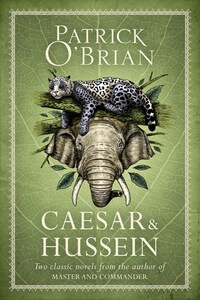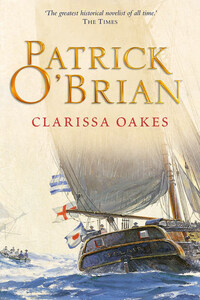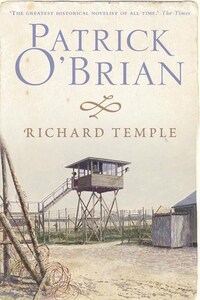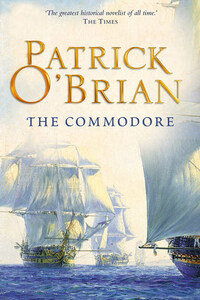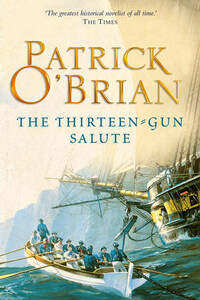CAESAR
The Life Story of a Panda-Leopard
HarperCollinsPublishers
1 London Bridge Street
London SE1 9GF
www.harpercollins.co.uk
This eBook edition published 2019
Caesar first published by G.P. Putnam’s Sons 1930
Second edition published by the British Library 1999
First published by HarperCollinsPublishers 2000
Hussein first published by Oxford University Press 1938
Second edition published by the British Library 1999
First published by HarperCollinsPublishers 2000
Copyright © The Estate of the late Patrick O’Brian CBE 1930, 1938, 1999
Patrick O’Brian asserts the moral right to be identified as the author of this work
Cover design by Andrew Davis © HarperCollinsPublishers Ltd 2019
Cover Images © Shutterstock.com
A catalogue record for this book is available from the British Library
All rights reserved under International and Pan-American Copyright Conventions. By payment of the required fees, you have been granted the non-exclusive, non-transferable right to access and read the text of this e-book on screen. No part of this text may be reproduced, transmitted, down-loaded, decompiled, reverse engineered, or stored in or introduced into any information storage and retrieval system, in any form or by any means, whether electronic or mechanical, now known or hereinafter invented, without the express written permission of HarperCollins.
Source ISBN: 9780008337377
Ebook Edition © December 2019 ISBN: 9780008337384
Version: 2019-10-22
Contents
Cover
Title Page
Copyright
Foreword
CAESAR: THE LIFE STORY OF A PANDA-LEOPARD
Chapter One
Chapter Two
Chapter Three
Chapter Four
Chapter Five
Chapter Six
Chapter Seven
Chapter Eight
Chapter Nine
Chapter Ten
Chapter Eleven
Chapter Twelve
Chapter Thirteen
Chapter Fourteen
Chapter Fifteen
Chapter Sixteen
Chapter Seventeen
Chapter Eighteen
Chapter Nineteen
HUSSEIN: AN ENTERTAINMENT
Chapter One
Chapter Two
Chapter Three
Chapter Four
Chapter Five
Chapter Six
Chapter Seven
Chapter Eight
Chapter Nine
Chapter Ten
Chapter Eleven
Chapter Twelve
Chapter Thirteen
Chapter Fourteen
Chapter Fifteen
Chapter Sixteen
Chapter Seventeen
Chapter Eighteen
Chapter Nineteen
Chapter Twenty
Chapter Twenty-One
About the Author
The Works of Patrick O’Brian
About the Publisher
It is a curious experience looking back from a distance of more than seventy years at the little creature who shared one’s name, bones, and indeed a good deal of one’s essential being, as far as it can be made out at all objectively. Curious and by no means entirely agreeable: I doubt if my present self would have liked the twelve-year-old boy who wrote this tale — he was certainly not very popular among his brothers and sisters. Nevertheless, that remote being and myself, his aged descendant, are linked by a common delight in reading: the boy read voraciously, often in bed, by the light of an electric torch. And when he was very young his stepmother, the kindest of women, took him to see her sister, who gave him the Reverend Mr Wood’s Natural History, a mid-nineteenth-century edition illustrated with a fair number of engravings. Since he was already something of a naturalist (an admired, much older brother had practically invented birds), the boy devoured the book, which was written by a sensible, well-informed, scholarly man. The boy was also something of an invalid, which interfered with his education and worried his father, a bacteriologist in the early days of vaccines and electrical treatment: the young fellow (pre-adolescent: a sort of elderly child) therefore spent long sessions in the incubator room, sitting at a glass-topped metal table and doing the simple tasks set by his tutor. But the tasks left a good deal of time unoccupied, and since it was obviously unthinkable to bring a book to read, the boy, by some mental process that I can no longer recall, decided to write one for himself, thus discovering an extraordinary joy which has never left him — that of both reading and writing at the same time.
It may seem absurd and pretentious, above all apropos of this piece of juvenilia, to say that writers, once they have experienced this intense delight, live fully only when they are writing fast, at the top of their being: the rest of the time only the lacklustre shell of the man is present, often ill-tempered (deprived of his drug), rarely good company.
I cannot remember the genesis of Hussein with great clarity, but I rather think that it derived from a tale I wrote for one of the Oxford annuals, to which I contributed fairly often: Mr Kaberry, an amiable man who ran the annual, said that it would be a pity to publish no more than the abbreviated form I showed him, and suggested that I should expand it to a book.
